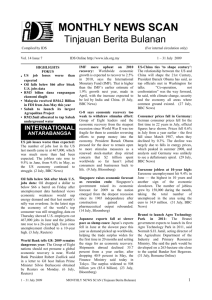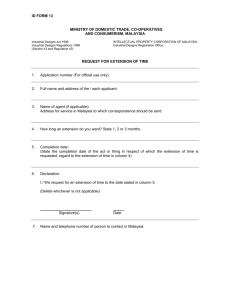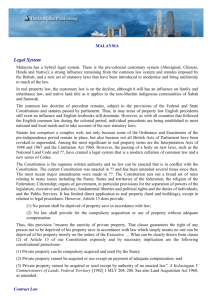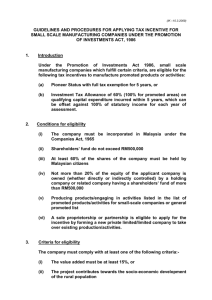Feb 2009
advertisement
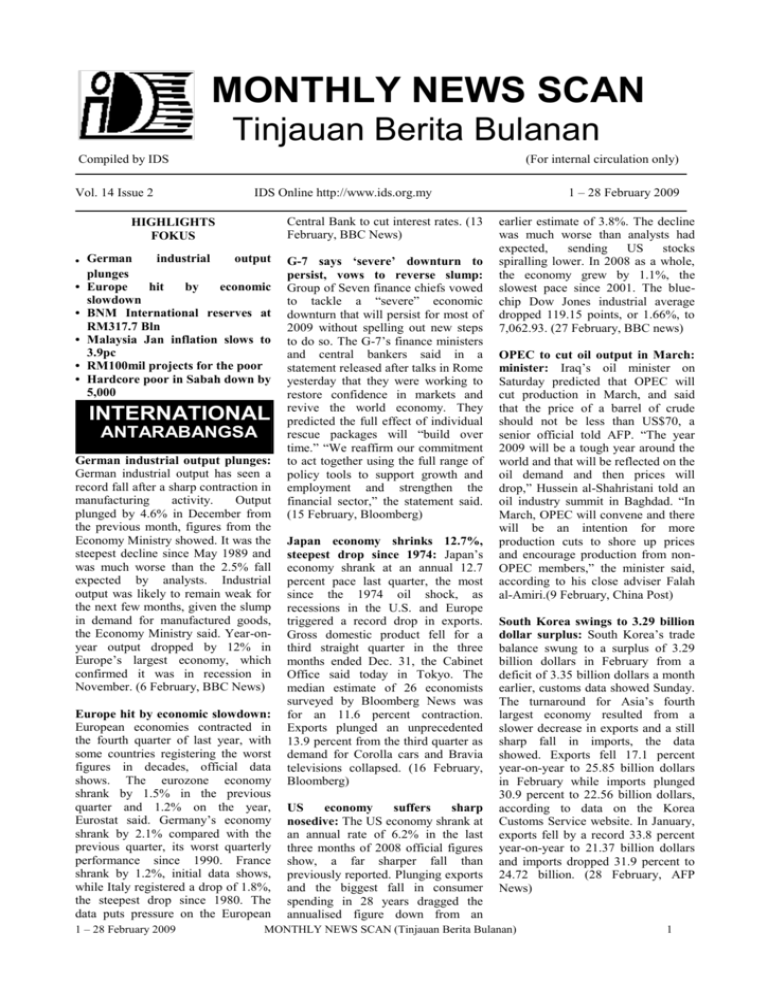
MONTHLY NEWS SCAN Tinjauan Berita Bulanan Compiled by IDS Vol. 14 Issue 2 (For internal circulation only) IDS Online http://www.ids.org.my HIGHLIGHTS FOKUS Central Bank to cut interest rates. (13 February, BBC News) • German • • • • • industrial output plunges Europe hit by economic slowdown BNM International reserves at RM317.7 Bln Malaysia Jan inflation slows to 3.9pc RM100mil projects for the poor Hardcore poor in Sabah down by 5,000 INTERNATIONAL ANTARABANGSA German industrial output plunges: German industrial output has seen a record fall after a sharp contraction in manufacturing activity. Output plunged by 4.6% in December from the previous month, figures from the Economy Ministry showed. It was the steepest decline since May 1989 and was much worse than the 2.5% fall expected by analysts. Industrial output was likely to remain weak for the next few months, given the slump in demand for manufactured goods, the Economy Ministry said. Year-onyear output dropped by 12% in Europe’s largest economy, which confirmed it was in recession in November. (6 February, BBC News) Europe hit by economic slowdown: European economies contracted in the fourth quarter of last year, with some countries registering the worst figures in decades, official data shows. The eurozone economy shrank by 1.5% in the previous quarter and 1.2% on the year, Eurostat said. Germany’s economy shrank by 2.1% compared with the previous quarter, its worst quarterly performance since 1990. France shrank by 1.2%, initial data shows, while Italy registered a drop of 1.8%, the steepest drop since 1980. The data puts pressure on the European 1 – 28 February 2009 G-7 says ‘severe’ downturn to persist, vows to reverse slump: Group of Seven finance chiefs vowed to tackle a “severe” economic downturn that will persist for most of 2009 without spelling out new steps to do so. The G-7’s finance ministers and central bankers said in a statement released after talks in Rome yesterday that they were working to restore confidence in markets and revive the world economy. They predicted the full effect of individual rescue packages will “build over time.” “We reaffirm our commitment to act together using the full range of policy tools to support growth and employment and strengthen the financial sector,” the statement said. (15 February, Bloomberg) Japan economy shrinks 12.7%, steepest drop since 1974: Japan’s economy shrank at an annual 12.7 percent pace last quarter, the most since the 1974 oil shock, as recessions in the U.S. and Europe triggered a record drop in exports. Gross domestic product fell for a third straight quarter in the three months ended Dec. 31, the Cabinet Office said today in Tokyo. The median estimate of 26 economists surveyed by Bloomberg News was for an 11.6 percent contraction. Exports plunged an unprecedented 13.9 percent from the third quarter as demand for Corolla cars and Bravia televisions collapsed. (16 February, Bloomberg) US economy suffers sharp nosedive: The US economy shrank at an annual rate of 6.2% in the last three months of 2008 official figures show, a far sharper fall than previously reported. Plunging exports and the biggest fall in consumer spending in 28 years dragged the annualised figure down from an 1 – 28 February 2009 earlier estimate of 3.8%. The decline was much worse than analysts had expected, sending US stocks spiralling lower. In 2008 as a whole, the economy grew by 1.1%, the slowest pace since 2001. The bluechip Dow Jones industrial average dropped 119.15 points, or 1.66%, to 7,062.93. (27 February, BBC news) OPEC to cut oil output in March: minister: Iraq’s oil minister on Saturday predicted that OPEC will cut production in March, and said that the price of a barrel of crude should not be less than US$70, a senior official told AFP. “The year 2009 will be a tough year around the world and that will be reflected on the oil demand and then prices will drop,” Hussein al-Shahristani told an oil industry summit in Baghdad. “In March, OPEC will convene and there will be an intention for more production cuts to shore up prices and encourage production from nonOPEC members,” the minister said, according to his close adviser Falah al-Amiri.(9 February, China Post) South Korea swings to 3.29 billion dollar surplus: South Korea’s trade balance swung to a surplus of 3.29 billion dollars in February from a deficit of 3.35 billion dollars a month earlier, customs data showed Sunday. The turnaround for Asia’s fourth largest economy resulted from a slower decrease in exports and a still sharp fall in imports, the data showed. Exports fell 17.1 percent year-on-year to 25.85 billion dollars in February while imports plunged 30.9 percent to 22.56 billion dollars, according to data on the Korea Customs Service website. In January, exports fell by a record 33.8 percent year-on-year to 21.37 billion dollars and imports dropped 31.9 percent to 24.72 billion. (28 February, AFP News) MONTHLY NEWS SCAN (Tinjauan Berita Bulanan) 1 NATIONAL NASIONAL BNM international reserves at RM317.7 bln: Bank Negara Malaysia’s (BNM) international reserves rose to RM317.7 billion (equivalent to US$91.6 billion) as at Feb 13 from RM316.8 billion (US$91.3 billion) on Jan 30. In a statement in Kuala Lumpur today, BNM said the reserves position was sufficient to finance 7.6 months of retained imports and was four times the short-term external debt. The reserves comprised foreign currency reserves (US$86 billion), International Monetary Fund reserves position (US$300 million), Special Drawing Rights (SDR) (US$200 million), gold (US$400 million) and other reserves (US$4.7 billion). The central bank’s assets as at Feb 13 stood at RM347.936 billion. (20 February, Bernama online) Malaysia Jan inflation slows to 3.9pc: Malaysia’s inflation slowed to an eight-month low in January as cheaper fuel pushed transport costs down, giving the central bank room to cut interest rates further to support an economy analysts say may contract this year. Consumer prices rose 3.9 per cent from a year earlier, after a 4.4 per cent gain in December, the Putrajaya-based statistics department said in a statement today. That compares with the median forecast for a 4.1 per cent increase in a Bloomberg News survey of 10 economists. (20 February, Business Times) Pakej kedua lebih komprehensif: Kerajaan memberi jaminan pakej rangsangan ekonomi kedua yang akan dibentangkan dalam bajet mini adalah lebih komprehensif dan menyeluruh. Menteri Kewangan Kedua, Tan Sri Nor Mohamed Yakcop berkata, bajet mini itu bakal menangani isu semasa dengan memberi bantuan kepada pihak yang memerlukannya dalam keadaan yang mendesak ini. Bagaimanapun, beliau enggan mengulas lanjut butir-butir terperinci bajet mini sehingga ia dibentangkan dalam tempoh antara dua hingga tiga minggu lagi oleh Timbalan Perdana Menteri, Datuk Seri Najib Tun Razak. (20 Februari, Utusan Malaysia) Pelaburan RM6b ke Tanjong Agas, Pekan: Taman Industri Minyak, Gas 1 – 28 February 2009 dan Maritim Tanjong Agas di Pekan Pahang telah berjaya menarik pelaburan sebanyak RM6 bilion yang mana sebahagian daripadanya diperolehi daripada pelabur asing. Pengarah Urusan Tanjong Agas Supply Base & Marine Services Sdn. Bhd. (TASBMS), Mohd Faidzal Ahmad Mahidin berkata, pelaburan itu diperoleh daripada tujuh buah syarikat yang memiliki latar belakang berbeza dalam industri minyak dan gas serta mahu menjadikan taman industri itu sebagai hab operasi dan pengembangannya pada masa depan. (17 Februari, Utusan Malaysia) MDV: RM2b pinjaman diagih: Malaysia Debt Ventures Bhd. (MDV), anak syarikat milik penuh Menteri Kewangan Diperbadankan telah mengeluarkan pinjaman berjumlah RM2.2 bilion bagi tahun kewangan berakhir Disember 2008 kepada 249 buah syarikat tempatan sejak penubuhannya. MDV dalam kenyataannya di sini berkata, bagi tahun kewangan 2008/2009, sebanyak 78 permohonan pinjaman bernilai RM658 juta telah diluluskan, manakala 34 permohonan yang bernilai lebih RM420 juta masih dalam proses penilaian dan kelulusan. (28 Februari, Utusan Malaysia) Italian investors see Malaysia as logistics hub: Italian investors see Malaysia as a potential hub for the logistics business in the Asean region, said director-general of the Malaysian Industrial Development Authority (MIDA), Datuk Jalilah Baba. “They are looking at integrated logistics because their logistics businesses are already in China,” she told Bernama. “So they are looking at another location to be the centre for Asean region as China is just enough to serve China market because it is so huge,” Jalilah said. “From Malaysia, they can probably serve India as well,” she said. (1 February, Bernama online) National timber industry policy to be introduced: The Government is to introduce a comprehensive National Timber Industry Policy which will give priority to the growth of downstream industries. Plantation Industries and Commodities Minister Datuk Peter Chin Fah Kui said the policy would envisage action plans and the RM22 billion timber industry’s future direction till 2020. Deputy Prime Minister Datuk Seri Najib Tun Razak will launch the policy on Feb 17 at the Putrajaya International Convention Centre. (10 February, Bernama online) Commodities export earnings increased 26.7 percent last year: Malaysia recorded RM112.4 billion in export earnings from commodities last year, Plantation Industries and Commodities Minister Datuk Peter Chin Fah Kui said today. He said this was an increase of 26.7 percent from the previous year which recorded RM88.7 billion. “This shows the importance of the commodity sector to the country and therefore, it must remain competitive,” he told reporters after officiating the Cocoa Smallholders, Estate and Entrepreneur Conference today. (18 February, Bernama online) Tourism traffic from U.S. to Malaysia shows a surprise rise in January 2009: Against the backdrop of the economic downturn in the United States resulting in the majority of Americans tightening their belts and doing away with luxury items, including expensive overseas trips, most industry pundits are surprised that Malaysia has actually been able to post a double-digit rise in tourist traffic from the United States in January 2009. Although the United States is not among the top 10 touristgenerating markets, its tourist traffic to Malaysia in January rose by 10.7 percent over the year-earlier month. (20 February, Bernama online) SRR salur RM9b kepada sistem perbankan: Penurunan keperluan rizab berkanun (SRR) sebanyak 150 mata asas kepada 2.0 peratus oleh Bank Negara Malaysia, akan menyalurkan semula kira-kira RM9 bilion ke dalam sistem kewangan, dan membolehkan bank-bank menggunakannya bagi menjana pendapatan. Bagaimanapun, penurunan kadar dasar semalaman (OPR) yang menyaksikan kebanyakan institusi kewangan menurunkan kadar asas berian pinjaman masing-masing, sebanyak 55 mata asas kepada 5.95 peratus, pastinya akan menjejaskan pendapatan dalam jangka pendek dengan mengambil kira tempoh awal pelarasan, kata ECM Libra Investment Research, dalam kajian bagi bulan Januari. (5 Februari, Utusan Malaysia) MONTHLY NEWS SCAN (Tinjauan Berita Bulanan) 2 LOCAL TEMPATAN RM100mil projects for the poor: Sabah will receive RM100 million from the Rural and Regional Development Ministry under the Economy Stimulation Programme to build 2,486 units of houses throughout the State this year. CM Datuk Seri Musa said of this, RM40 million would be for the construction of houses at the water village of Kampung Mengkabong, the cradle of hardcore poverty in Tuaran district. He said 1,000 units of houses similar to those built under the Hardcore Poor Housing Project (PPRT) scheme would be built under the Mengkabong relocation programme. (11 February, Daily Express) Hardcore poor in Sabah down by 5,000: Datuk Seri Musa Haji Aman said the poverty eradication programme in Sabah is moving in the right direction as evidenced in the decreasing number of hardcore poor household heads (KIRMTs) last year compared to 2007. The Chief Minister said there were 21,514 KIRMTs and disabled people (OKUs) in 2007. However, as at Feb. 10 this year, the number had reduced to 16,403 that include OKUs and those in the advanced age bracket. “This is certainly a good improvement,” he said after chairing the People’s Welfare Development Scheme Steering Committee at Wisma Innoprise, Likas, Tuesday. (11 February, Daily Express) SESB allocates RM500 million to improve electricity supply in Sabah: Sabah Electricity Sdn Bhd (SESB) has allocated RM500 million this year for a project to improve the electricity supply system in Sabah, its managing director Ir Baharin Din said today. He said the large allocation was necessary as Sabah still faced the problem of a shortage in the electricity supply and efforts to overcome it had to be done through the implementation of this project. “The allocation which is an SESB investment, was obtained through loans from the state and federal governments. We are thankful for the loans,” he said in his speech at a SESB briefing with community leaders at Gum-Gum, Sandakan. (19 February, Bernama online) 1 – 28 February 2009 RM80 mil to improve Keningau roads: Rural Development Assistant Minister Datuk Sairin Hj Karno said that the Prime Minister has approved RM80 million to overcome road congestion in the town area. He said the allocation, which will be spent on building a ‘highway’ and upgrading other congested access roads leading to the town centre, was obtained through a letter to the Prime Minister that was signed by all elected representatives from the interior. (23 February, New Sabah Times) Sabah gets huge allocations for Human Capital Development Programmes: Sabah was among the states that received huge allocations for human capital development programmes under the Ninth Malaysia Plan. Higher Education Minister Datuk Seri Mohamed Khalid Nordin said Universiti Malaysia Sabah (UMS) received RM644 million and that another RM200 million had been allocated to build a polytechnic in Sandakan this year. As for Tawau, he said his ministry has allocated RM36 million to build the Universiti Teknologi Mara (UITM) campus in Balung next month or in April. (22 February, New Sabah Times) Govt initiates job opportunities by setting up Sabah Job Centre: The state government has made efforts to provide job opportunities such as the setting up of the Sabah Job Centre. Minister of Resource Development and IT Datuk Dr Yee Moh Chai said job seekers are encouraged to register with the Job Centre to enable the government to monitor unemployment as well as to help the unemployed to secure jobs according to their qualifications and skills. To date, 7,253 job seekers and 340 employers have registered with the Job Centre. (20 February, New Sabah Times) SLDB and nuclear M’sia in Nabawan agarwood venture: Nabawan is slated to house the largest agarwood (gaharu) estate in Sabah, following an agreement inked by the Sabah Land Development Board (SLDB) and Malaysian Nuclear Agency (Nuclear Malaysia). The document signed by SLDB general manager Jhuvarri Majid and Nuclear Malaysia Director-General Datuk Dr Daud Mohamad calls for the development of the agarwood industry in Sabah and the setting up of an essential oil (agarwood) extraction plant in Nabawan, SLDB said in a statement. (16 February, Daily Express) Cyber project launched in Kota Marudu: A pilot project known as InfoSTI@MOSTI by the Ministry of Science, Technology and Innovation where Hifi wireless service, computer training and cyber-net browsings are available for free, is set to change the mind set of rural people. In launching the project at Kota Marudu and at Petra Jaya, Sarawak simultaneously through teleconferencing Sunday morning, its Minister Datuk Maximus Johnity Ongkili said the project is to support the national aspiration to build an informed society by encouraging the use of science, technology and innovation (STI) to improve the life of the people especially in rural areas. (23 February, New Sabah Times) Maranjak homestay set to offer world’s longest house: The Maranjak longhouse homestay at Matunggong near here is all set to offer the world’s longest house by June this year. Homestay owner, Maranjak Malarat, told the New Sabah Times on Tuesday that they have begun extension work on the existing longhouse which has a total of 11 rooms. When completed, it will have 75 rooms available for rent at RM75 per room for foreigners and RM55 per room for locals. Currently the longhouse measures 120 feet but after extension, the longhouse will be 818 feet long. (19 February, New Sabah Times) RM10m skills upgrade: Chief Minister Datuk Seri Musa Haji Aman said the Government has allocated RM10 million this year to ensure efficiency and high performance of the civil service. Realising the importance of good governance, the Government decided to allocate the sum to enhance skills under the human resource development programme at all ministries including departments and its agencies. Speaking at the State and Federal civil services assembly at Menara Tun Mustapha, Likas, Monday, he said the public service was a very important institution that ensures success in the administration and running of a government. (10 February, Daily Express) MONTHLY NEWS SCAN (Tinjauan Berita Bulanan) 3 SELECTED FACTS AND FIGURES FAKTA MUTAKHIR MALAYSIA: MAJOR EXPORT PRODUCTS December 2008i (RM million) Total exports Electrical & electronic products LNG Palm oil Chemical & chemical products Crude petroleum Machinery, appliances & parts Refined petroleum products Wood products Manufactures of metal Optical & scientific equipment i 2007p 46,088.4 16,997.7 5,181.6 3,547.7 2,396.9 1,812.8 1,720.1 1,644.9 1,311.9 1,205.7 1,033.8 54,161.4 22,845.0 2,493.9 3,778.5 3,328.6 3,455.6 1,540.9 2,383.5 1,292.8 1,449.3 1,020.5 = interim data ; p = provisional data (Source: 13 February, New Straits Times) MALAYSIA: WHAT IS THE MOST IMPORTANT ISSUE OR PROBLEM IN THE COUNTRY TODAY? Don't know 3% None 4% Others 3% Need for Malay empowerment/unity 1% Influx of illegal immigrants 1% Education 1% Ineffective/unconcerned government 1% Poverty & uneven development 1% Quality of politicians 2% Lack of unity among Malaysians 2% Unemployment 4% Political instability 4% Social problems 4% Crime & public safety 6% Worsening ethnic relations 6% Corruption 9% Racial inequality 9% Inflation & rising cost of living 17% 22% Unfavourable economic conditions 0% 5% 10% 15% (Source: 3 February, New Straits Times) MALAYSIA: CONSUMER PRICE INDEX Consumer Price Index (2005=100) (% Change) 2008/2007 Malaysia Peninsular Malaysia Sabah Sarawak 5.4 5.4 6.0 6.0 20% 25% Jan 2009/2008 3.9 3.7 5.6 4.0 (Source: 20 February, Department of Statistics Malaysia official website) 1 – 28 February 2009 MONTHLY NEWS SCAN (Tinjauan Berita Bulanan) 4 MALAYSIA: GROSS DOMESTIC PRODUCT/GROSS NATIONAL INCOME Gross Domestic Product/ Gross National Income 2007 2008 3rd Quarter 2008 4th Quarter Gross Domestic Product (GDP): Current Prices (RM million) 641,864 198,653 177,342 Gross Domestic Product (GDP): Constant 2000 Prices (RM million) 505,353 136,211 131,261 6.3 4.7 0.1 628,106 192,845 n.a 23,115 27,674 n.a GDP Growth Rate Constant 2000: Prices (%) Gross National Income (GNI): Current Prices (RM million) Per Capita GNI: Current Prices (RM) (Source: 27 February, Department of Statistics Malaysia official website) 174,453 61,051 136,947 122,009 49,538 48,595 55,707 123,429 147,191 130,979 71,802 142,058 129,996 121,196 61,190 52,824 60,000 50,993 80,000 55,517 100,000 51,524 120,000 75,791 140,000 Malaysian 66,666 112,218 160,000 116,027 International 180,000 142,727 SABAH: VISITORS ARRIVAL, 2008 40,000 20,000 0 Jan Feb Mar Apr May June July Aug Sept Oct Nov Dec Note: 1. Direct Arrivals statistics is based on the IMM26 cards and indirect arrivals is based on the Head Count Method by the Immigration Department. 2. Malaysian arrivals is based on movements within Malaysia. (Source: Sabah Tourism Board website) Sept Oct 235,504 Aug 185,542 202,898 July 171,547 202,781 June 176,253 203,917 193,051 176,713 200,000 196,662 250,000 167,551 188,009 SABAH: TOTAL NUMBER OF VISITORS, 2008 150,000 100,000 50,000 0 Jan Feb Mar Apr May Nov Dec (Source: Sabah Tourism Board website) 1 – 28 February 2009 MONTHLY NEWS SCAN (Tinjauan Berita Bulanan) 5 1 – 28 February 2009 MONTHLY NEWS SCAN (Tinjauan Berita Bulanan) 6


